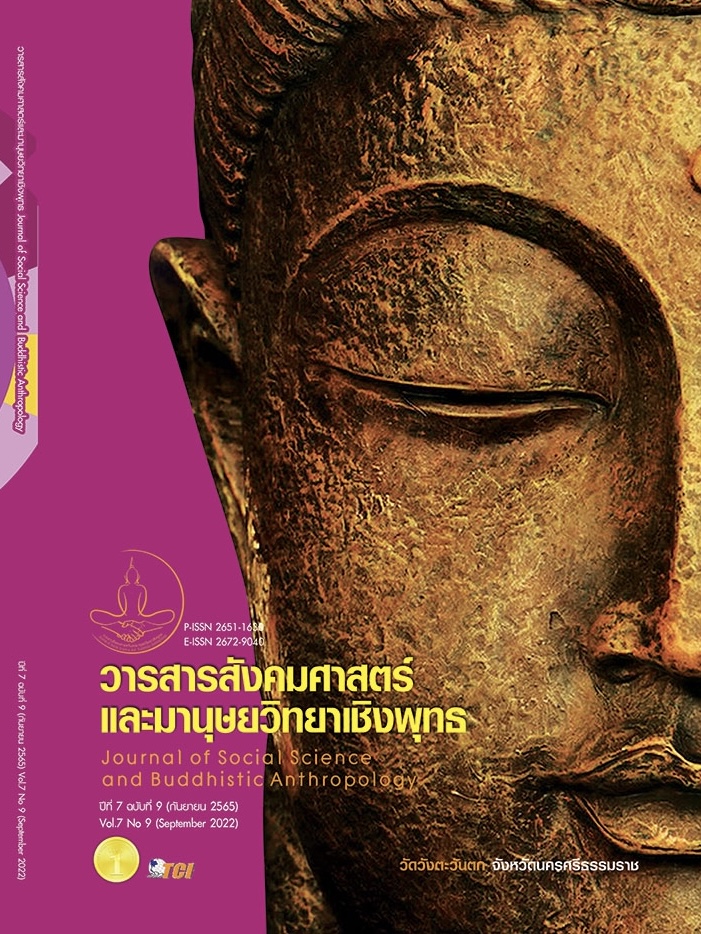THE MEASUREMENT OF 7 HABITS OF HIGHLY EFFECTIVE PEOPLE FOR PRIVATE ORGANIZATION EMPLOYEES
Keywords:
The Measurement, The 7 Habits of Highly Effective People, Private Organization EmployeesAbstract
The objective of this research was to develop the measurement of the seven habits of highly effective people in terms of employee behavior in accordance with the working context of private organizations employees in Thailand. A qualitative method by using an in-depth interview with semi-structured questions conducted in the selected 8 specialists. The results of the study found that the seven habits of highly effective people for operator developed from Stephen R. Covey's conceptual framework. It is divided into 7 habits: 1) be proactive 2) begin with the end in mind 3) put first things first 4) think win-win 5) seek first to understand then to be understood 6) synergize and 7) sharpen the saw. After validated indexes of item-objective congruence (IOC) by 3 professors and confirmatory factor analysis (CFA), the habits 1 to habit 7 had 22 items with a Cronbach’s alpha (coefficient alpha) of .70, .81, .73, .82, .73, .84 and .70 respectively. All means of the seven habits of highly effective people were at high levels as 4.64, 4.53, 4.41, 4.95, 4.94, 5.05 and 4.36, respectively. The measurement had an index of FIT x2 = 272.91, df = 188, p < .01, RMSEA = .046, CFI = .99, NFI = .96, SRMR = .047, GFI = .90, with a composite reliability (CR) .955 and average variance extracted (AVE) .480. The 7 habits of highly effective people related to each other in all aspects with a statistically significant at the level of .01
References
กนกวรรณ เทพพันธา. (2554). การวัดระดับอุปนิสัยของนักศึกษาคณะเภสัชศาสตร์ มหาวิทยาลัยเชียงใหม่. ใน วิทยานิพนธ์บริหารธุรกิจมหาบัณฑิต สาขาการบริหารธุรกิจ. มหาวิทยาลัยเชียงใหม่.
กอบแก้ว จันทา. (2555). ปัจจัยที่สัมพันธ์กับพฤติกรรมการทํางานของครู กลุ่มโรงเรียนในเครือไทย เทค. ใน วิทยานิพนธ์ศึกษาศาสตรมหาบัณฑิต สาขาบริหารการศึกษา. มหาวิทยาลัยศรีปทุม.
จำเนียร จวงตระกูล. (2552). คุณภาพชีวิตในการทำงาน. กรุงเทพมหานคร: บริษัทศูนย์กฎหมายธุรกิจอินเตอร์ เนชั่นแนล จำกัด.
ธัตธ์ธนนญ์ เกียรติไชยกร. (2553). การวัดระดับอุปนิสัยของนักศึกษาพยาบาลศาสตร์ วิทยาลัยพยาบาลบรมราชชนนี จังหวัดเชียงใหม่. ใน วิทยานิพนธ์บริหารธุรกิจมหาบัณฑิต สาขาการบริหารธุรกิจ. มหาวิทยาลัย
เชียงใหม่.
นิตินัย หมีสอาด. (2556). ความสัมพันธ์ระหว่างการบริหารสมดุลระหว่างชีวิตและการท างานกับความ ผูกพันต่อองค์กรของพนักงาน. ใน วิทยานิพนธ์บริหารธุรกิจมหาบัณฑิต สาขาการบริหารธุรกิจ. มหาวิทยาลัยเทคโนโลยีราชมงคลธัญบุรี.
เนตรชนก คำผาลา. (2558). การวัดระดับอุปนิสัยของนักศึกษาคณะเทคโนโลยีการประมงและทรัพยากรทางนํ้า มหาวิทยาลัยแม่โจ้ โดยใช้หลักการเจ็ดอุปนิสัยพัฒนาสู่ผู้มีประสิทธิผลสูงยิ่ง. ใน วิทยานิพนธ์บริหารธุรกิจมหาบัณฑิต สาขาการบริหารธุรกิจ. มหาวิทยาลัยเชียงใหม่.
รสกร ตั้งไพบูรณ์ทรัพย์. (2554). การวัดระดับอุปนิสัยของนักศึกษาคณะพยาบาลศาสตร์ มหาวิทยาลัยเชียงใหม่ โดยใช้หลักการเจ็ดอุปนิสัยสำหรับผู้ทรงประสิทธิผลยิ่ง. ใน วิทยานิพนธ์บริหารธุรกิจมหาบัณฑิต สาขาการบริหารธุรกิจ. มหาวิทยาลัยเชียงใหม่.
สมชัย ปราบรัตน์. (2561). ความสมดุลของชีวิตและทำงานของพนักงานในธุรกิจอุตสาหกรรมการผลิตประเภทอาหารแปรรูปบรรจุกระป๋อง: กรณีศึกษาเฉพาะ 3 บริษัทขนาดใหญ่ในจังหวัดสงขลา. ใน เอกสารการประชุมหาดใหญ่วิชาการระดับชาติและนานาชาติ ครั้งที่ 9 (น. 528-529). มหาวิทยาลัยหาดใหญ่.
สุวิมล บัวผัน. (2554). ความสมดุลระหว่างชีวิตกับการทำงานของบุคลากรสายสนับสนุนวิชาการ คณะพานิชยศาสตร์และการบัญชี มหาวิทยาลัยธรรมศาสตร์. ใน วิทยานิพนธ์พัฒนาแรงงานและสวัดิการมหาบัณฑิต
สาขาสังคมสงเคราะห์. มหาวิทยาลัยธรรมศาสตร์.
Covey, S. R. (2012). The seven habits of highly effective people. New York: Simon and Schuster.
Creswell, J. W. & Plano Clark, V. L. (2018). Designing and Conducting Mixed Methods Research. Thousand Oaks, CA: Sage Publications.
David, Erlandson. (1993). Doing Naturalistic Inquiry: A Guide to Methods. USA: SAGE Publications.
Haygroup. (2015). Engaging Hearts & Minds: Preparation for a Changing World. Retrieved December 1, 2020, from http://www.haygroup.com/
Hutton, A. (2005). The case for work/life balance: Closing the gap between policy and practice. Christchurch, New Zealand: Hudson Highland Group.
Robbins, S. P. (2005). Organizational behavior: Concepts, controversies, and applications (11th ed.). Englewood Cliffs, NJ: Prentice-Hall.
Downloads
Published
How to Cite
Issue
Section
License
Copyright (c) 2022 Journal of Social Science and Buddhistic Anthropology

This work is licensed under a Creative Commons Attribution-NonCommercial-NoDerivatives 4.0 International License.









